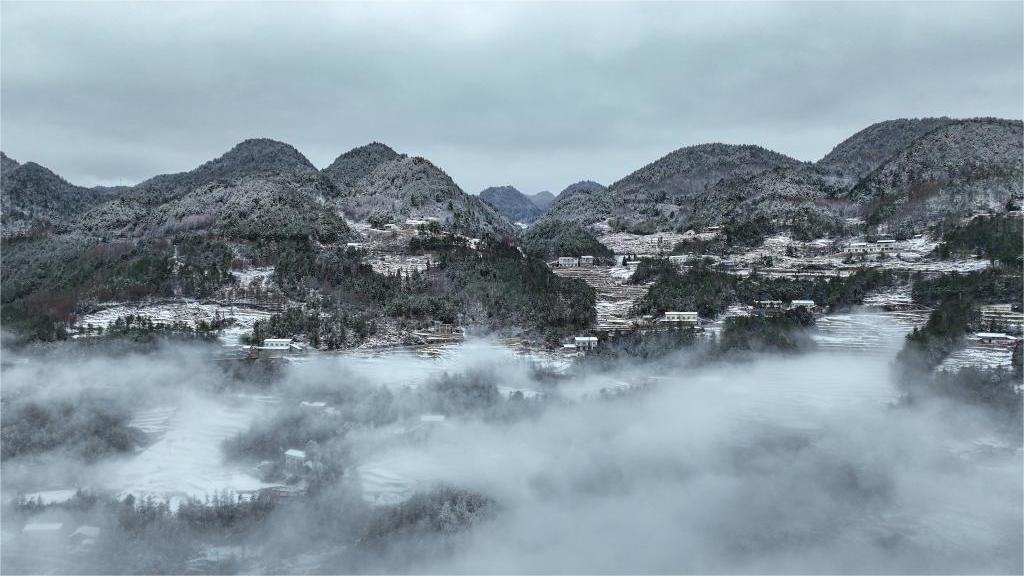Meteorological authority issues four extreme weather warnings; freezing weather strands travelers returning home for Spring Festival
Prolonged extreme weather continues to sweep across Central and East China. On Sunday morning, China's National Meteorological Center (NMC) issued four extreme weather warnings, including a blue warning for strong winds, an orange warning for freezing, an orange warning for blizzards, and a yellow warning for dense fog. Due to the impact of extreme weather, a large number of travelers returning home before the Spring Festival have been stranded on their way, and local authorities and departments are actively taking measures to cope with the situation.
According to the forecast, from 8 am Sunday to 8 am Monday, blizzards are expected to mainly concentrate in the area between central and eastern China, including the eastern part of Henan, the central-northern part of Anhui, the central-northern part of Jiangsu, and the central-eastern part of Shandong, with snowfall of 10 to 13 centimeters expected. Freezing weather, on the other hand, will affect a wider range of provinces including those in East China, Central China, and Southwest China. Dense fog will mainly occur in South China.
Central China's Hubei Province experienced a maximum snow depth of 18 centimeters over the past day. On Sunday, the provincial capital Wuhan witnessed heavy to blizzard levels of snowfall. A resident of Wuhan told the Global Times on Sunday that this is the largest snowfall he has seen in the 20 years he has lived in Wuhan, "It's as if I was in Northeast China."
The resident, surnamed Wang, said that the extreme snowfall has already affected local urban transportation, and almost all trains departing from Wuhan are unable to depart on time. In addition, logistics have also been affected. On Sunday, many courier companies suspended or delayed their services for receiving and sending parcels in Wuhan.
Due to the large-scale rain, snow, and freezing weather, both runways at the Wuhan Tianhe Airport were closed on Sunday morning. Some trains departing Wuhan were also suspended, and a number of entrances to highways in Hubei were temporarily closed. As a crucial transportation hub in Central China, the traffic issues in Wuhan have affected a large number of passengers, especially during the busiest inter-provincial transportation period of the year - the Spring Festival travel rush.
Due to the influence of low temperature rain storms and snowy weather, more than 50 pairs of trains running between cities in Hubei have been suspended. A total of 22 pairs of overnight high-speed trains running between Hubei cities to Beijing, Guangzhou, Shenzhen, and Shanghai have also been suspended.
The Global Times learned that there are currently a large number of stranded passengers at the high-speed railway station in Wuhan, with extensive delays in train services, some lasting up to 11 hours. Additionally, a flight scheduled to depart from Wuhan Airport on Saturday was delayed for eight hours, with passengers not allowed to leave the plane for six hours, leading to disputes between passengers and staff, media reported.
In addition, on Sunday, on China's X-like platform Sina Weibo, some netizens said they had been trapped on highways in Hubei for over 10 hours, facing difficulties such as road closures, traffic jams, running out of fuel, lack of food and hot water, and difficulties in reaching rescue helplines. In response, the Hubei Provincial Department of Transportation stated that they attach great importance to this situation and are already coordinating efforts to address it, as reported by China Newsweek.
Due to snowfall and icy road conditions, 1,665 toll stations across the country were closed on Sunday, according to China News Service.
According to flight information provider VariFlight, multiple airports in the provinces of Hubei and Anhui have been affected. On Sunday, a large number of flights were canceled at the Wuhan, Yichang, and Shiyan airports in Hubei, while the Jingzhou airport experienced significant delays. In Anhui, there were small-scale cancellations at the Hefei airport and large-scale cancellations at the Anqing airport. The Wuhan airport has been impacted the most, with a flight operation rate of less than 20 percent, resulting in over 200 scheduled flights being canceled as of 7 pm Sunday.
Due to extreme weather conditions in Central China, trains traveling from the north to the south and vice versa have also been restricted. According to the railway department's timetable, high-speed trains departing from Beijing to Shanghai, Anhui, Zhejiang, and other eastern regions were mostly delayed on Sunday. Only trains departing from Beijing to the surrounding northern regions were not affected.
The railway department reminds passengers to closely monitor train schedules ahead and avoid "blindly" going to stations, in order to prevent station congestion. In addition, passengers will not be charged any refund fees for ticket cancellations due to train suspensions.
In Wuhan, the railway bureau has taken multiple measures to cope with the severe cold weather. Major railway stations have mobilized over 3,000 personnel from various railway units to form a team for snow removal and de-icing. Additionally, 48 internal combustion locomotives have been arranged to be on standby at all times. Wuhan has also promised to promptly announce train operation conditions and delay information, and has increased the number of ticket refunds and exchange windows to facilitate passengers. Over 1,000 blankets have been prepared on high-speed trains and regular trains for the use of priority passengers such as elderly, disabled, and pregnant travelers. Along the route, tens of thousands of instant noodles, bottled water, and ham sausages have been prepared as emergency food to meet the needs of passengers.
Currently, major train stations such as the Shanghai and Guangzhou stations have announced that their waiting rooms will be open at night, providing comfortable waiting environments for travelers.
Sunday was the 10th day of the 2024 Spring Festival travel rush. Gao Bo, deputy director of the Transport Service Department of the Ministry of Transport, said that in the first nine days of the Spring Festival travel rush, the daily cross-regional passenger flow across the country exceeded 190 million trips, and the overall transportation operation was stable and orderly.
According to the weather forecast, low temperatures in Central and East China will continue in the upcoming week. Especially in Henan, Anhui, Hubei, and Hunan, maximum temperatures will be more than 6 C lower than usual, and some areas may be about 10 C lower. These lower temperatures will continue for nearly a week.
Photos
Related Stories
- China braces for cold waves, blizzards with targeted measures
- Special winter enthusiasm in NE China
- Harbin ice carver creates 'icefish' sculpture in just 30 minutes
- China raises response level for snow, freezing weather amid travel rush
- Localities make emergency plans in response to unprecedented weather challenges during ‘busiest’ Spring Festival travel rush
- China renews orange alert for blizzards
Copyright © 2024 People's Daily Online. All Rights Reserved.









